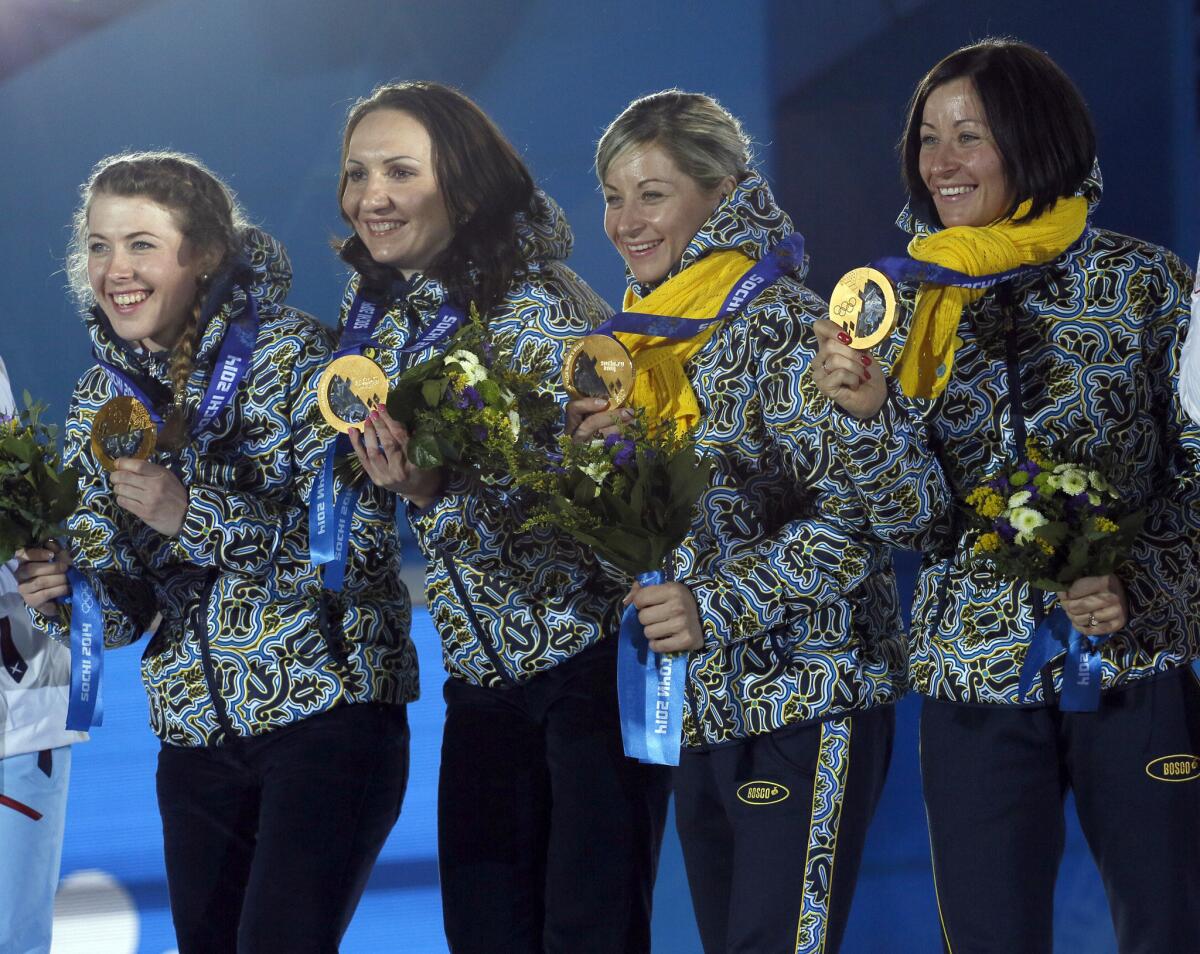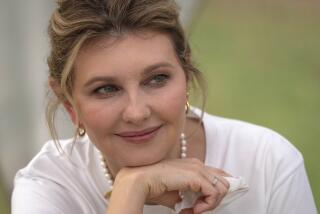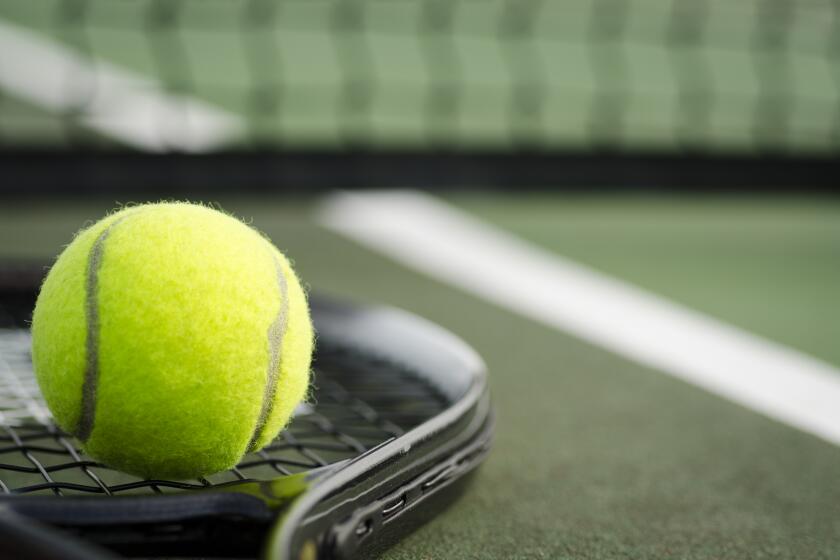Column: Ukrainian biathletes are a unifying force of hope at Sochi Olympics

- Share via
FROM SOCHI, Russia — They had stood crammed together against metal barriers for nearly two hours in the gusting cold, strangers squeezed into neighbors, a mass of wildly varied dialects and different colored flags.
The temperature dropped, the wind grew, but they would not leave. The program on the giant stage dragged on, but the crowd only thickened, thousands gathering at the Olympics Medal Plaza on Saturday night for different reasons, all seemingly sticking around for the same thing.
They were waiting for hope. They were waiting for the women from Ukraine.
“They fights,” said a man clutching a faded blue and yellow flag for warmth. “We thanks.”
FRAMEWORK: Best images from Sochi Games
The four members of the Ukrainian women’s biathlon relay team would be honored at the final medal presentation, the ninth of nine ceremonies. They were only four medals among many, yet rarely have such few pieces of Olympic hardware been embraced by so many.
Late the previous night in the Caucasus Mountains, the women had won the country’s first Winter Olympics gold medal in 20 years. For weeks, civil unrest has rocked the Ukrainian capital of Kiev, and the death toll in clashes between protesters and police had reached 82, according to official reports.
They won after refusing to leave the Games even though one teammate had already done so. They won by upsetting the host Russians with an effort so emotionally exhausting, Ukrainian captain Olena Pidhrushna finished the race sprawled face-down in the snow.
Back in Kiev, their victory was greeted with a huge cheer by protesters gathered in Independence Square, thousands screaming, “Glory to the heroes!” In the mountains, Pidhrushna began the post-event news conference by asking for a moment of silence, “in honor of those who died in the last few days.”
It was a victory so compelling, International Olympic Committee President Thomas Bach told the Associated Press it was his highlight of the Games.
“Seeing your capital burning …feeling this responsibility … then winning the gold medal, that really stands out for me,” Bach said.
The Ukrainian foursome had put down their rifles and skis, received flowers in a quick ceremony in the mountains, then, finally, Saturday night, they had been driven to Olympic Park to be given the gold.
As the four women shyly marched to the stage wrapped in designer yellow-and-blue parkas that seemed to swallow them, they had no idea they were about to receive so much more.
“Uu-kree-nay!” shouted the Russian announcer, the wait was over, and the biggest roar of the Olympics began.
It sprung from those hanging on the front railing covered in Ukrainian flags. It swelled toward the back, to those waving red, white and blue Russian flags. It rippled through those holding other flags, Canadian, American, Korean, growing louder by the wondrous minute.
The cheers were louder and more prolonged than even those that had greeted the Russian athletes. At one point, the cheers were accompanied by a Russian chant of “Rus-y-a, Rus-y-a.’’ There was even a cheer from a bearded man who had attached both Russian and Ukrainian flags to the same pole.
On the stage, the four women laughed, and their eyes welled up with tears, they hugged, and then they just stared in disbelief.
“We knew there were very few Ukrainian people here,’’ team member Juliya Dzhyma told The Times after exiting the stage. ‘’But then we stepped out and the sound was everywhere.”
It was thousands celebrating the strength of the four, a most unassuming four, one wearing bright earrings, another wearing her hair in braids, none of them appearing to be exceptional athletes, yet their quiet strength was unmistakable.
“A lot of people from the Ukraine wrote us messages, saying they were in the streets, waiting for us to win,” Pidhrushna said.
When the Ukrainian flag was raised against a backdrop of the raging Olympic fire — a far different fire from the one back home — the crowd hushed. Up on the podium, for the first time all night, four gold medalists were loudly singing every word of their national anthem.
Said Dzhyma: “We are overwhelmed with happiness.”
Added Pidhrushna: “We can only hope this is a first step toward peace.”
By the time the anthem was finished, several in the crowd were overwhelmed, including Olympic volunteer Kateryna Chernii, who hung on the front rail and wept throughout the song.
“We’ve waited for this for years,” she said. “It’s a win here in sport, but I can only hope it’s also a win for our country.”
Standing next to Chernii was Mima Dzhyma, the mother of gold medalist Juliya. She had also been crying. She wiped her eyes and put the victory into universal perspective.
“It’s so wonderful when children allow their mothers to be proud of them,” she said.
Later in the interview area, the four women still seemed shocked, quietly rolling their medals in their fingers and not quite knowing what to say. They are athletes, they are not politicians, but they know what they did was far bigger than a skid and a shot, and when they were asked whether they thought their victory could actually be one snowy step toward the unification of their fractured nation, their answer was firm.
“We believe,” said Pidhrushna. “We trust.”
It was that sort of night, the world as family, sports as symbol, the Olympics as a place where people are willing to wait two hours in the cold not for an athlete or a team, but an ideal. It was a night when the standing ovation was for hope.
Times reporter Sergei Loiko contributed to this report.
Follow Bill Plaschke on Twitter @billplaschke
More to Read
Go beyond the scoreboard
Get the latest on L.A.'s teams in the daily Sports Report newsletter.
You may occasionally receive promotional content from the Los Angeles Times.











